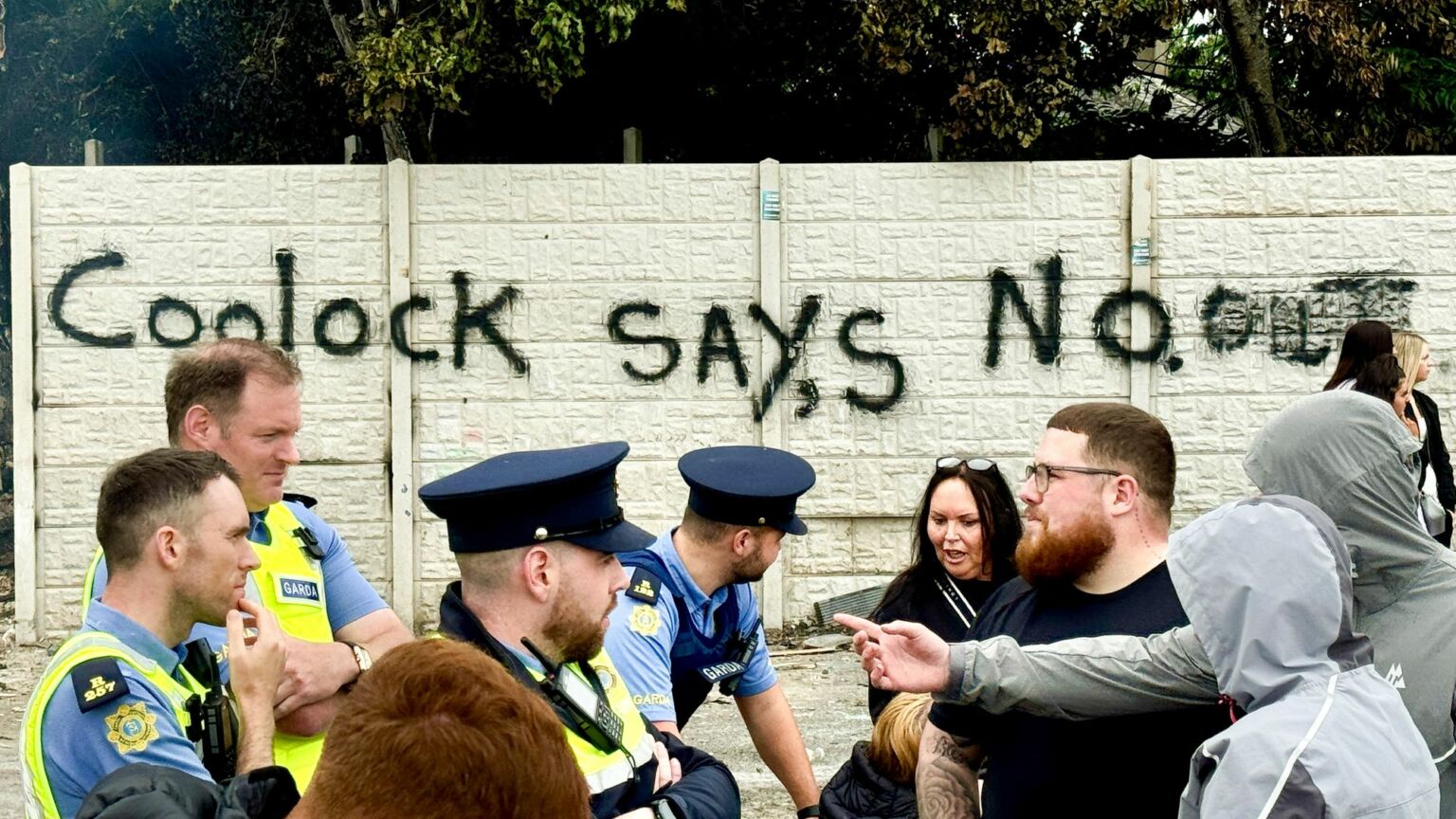Ireland’s immigration crisis has brought it to boiling point
The Irish elites are inflaming mass unrest with their refusal to rethink their asylum policy.

Want to read spiked ad-free? Become a spiked supporter.
Coolock, north Dublin has become a focal point for the Irish immigration debate. In the past week, there have been five arson attacks in the large suburban area, as well as rallies amassing more than 600 people. Sunday night marked the fourth fire in four days at a site earmarked for asylum seekers.
The former Crown Paints warehouse is currently undergoing renovations to house 500 international-protection applicants. The move has sparked large demonstrations in the area. Protesters have been setting up makeshift encampments at the site since spring. The campaigners’ argument is simple: the community doesn’t want large numbers of asylum seekers housed there.
The chaos at Coolock is unusual for its speed and ferocity. Over the course of the past week, Gardai have been injured in violent protests and have failed to secure the area from repeated fires. Ireland’s Public Order Unit – the riot police – have been repeatedly deployed, with stand-offs involving bricks and pepper spray.
This isn’t the first time protests over migration have turned ugly in Ireland. Less than an hour down the road in Newtownmountkennedy, East Wicklow, a fire broke out at a similar site promised for asylum-seeker accommodation in April. In May, a site in Tallaght, another Dublin suburb, was targeted by not one, but two pipe-bomb attacks, with one being foiled by Gardai. The area is set to receive 350 asylum seekers. There have also been large, peaceful demonstrations by local residents who object to asylum seekers being prioritised for housing.
So violent and destructive has the rioting become that crisis talks have reportedly been held between taoiseach Simon Harris and the leader of the opposition, Sinn Féin’s Mary Lou McDonald. In an interview this week with radio station Newstalk, McDonald marked a shift from the usual blanket condemnation of such protests as racist thuggery. She instead argued that ‘it is equally dangerous and debilitating not to listen to the real experience of marginalised and poorer communities on the ground’.
McDonald is right to point out that these new housing sites are almost always situated in deprived areas, both rural and urban. Some might recognise Coolock from the film The Commitments and many of its run-down housing remains unchanged from the 1990s. It’s also infamous for the Stardust tragedy, a suspected arson attempt at a club in 1981, which killed 48 and injured 214. Tallaght is another poor community on the outskirts of Dublin, with sprawling and under-resourced estates.
These communities simply cannot cope with the sheer volume of newcomers planned. Over 10,600 people applied for asylum in Ireland in the first half of this year. That figure is expected to double by Christmas. When Ireland is faced with a chronic housing shortage, rising fuel bills and a stagnant economy, it doesn’t take a genius to work out that there might be issues with dumping more people in areas that can barely cope with their existing populations.
It’s not just the numbers that are the problem. A moratorium on open discussion about immigration has allowed residents’ frustrations over doctors’ appointments and school places to spill over into ugly anti-immigrant sentiment. Many of the peaceful protesters tell reporters that they’re simply not being listened to. Indeed, after the Dublin riots in November 2023, tánaiste Micheál Martin promised to use swift and harsh hate-crime legislation against anyone who might even be perceived as hateful toward migrants or asylum seekers. The message from Irish elites to the working class has been to put up and shut up.
While rioting is never acceptable, Irish people do have every right to be furious with the political class. Housing is Ireland’s number-one issue, particularly in Dublin. Here, queues to sign up for new rentals can stretch down the street. Hundreds of thousands of young people are unable to leave home, with a housing deficit of between 212,500 and 256,000 – a shocking number given the country has a population of just five million.
Tensions in Coolock and other areas will continue to rise unless government policy on asylum seekers changes drastically. In their meeting, both Harris and McDonald agreed that something had to be done about ‘community engagement’. And it seems that Sinn Féin is seeking to get ahead of Fine Gael with an announcement of a new immigration policy this week. It promises that under a Sinn Féin government there will be an ‘official audit of the existing capacity of local services before an accommodation centre for asylum seekers is opened’.
As it stands, Ireland’s undemocratic and haphazard approach to immigration is deeply unfair. It is unfair to the communities expected to grin and bear it when forced to accept further squeezes on resources. And it is unfair to the asylum seekers – some with families – who are expected to make a life under such hostile conditions. Sooner or later, something has got to give.
Ella Whelan is the author of The Case For Women’s Freedom, the latest in the Academy of Ideas’ radical pamphleteering series, Letters on Liberty.
Picture by: Getty.
Who funds spiked? You do
We are funded by you. And in this era of cancel culture and advertiser boycotts, we rely on your donations more than ever. Seventy per cent of our revenue comes from our readers’ donations – the vast majority giving just £5 per month. If you make a regular donation – of £5 a month or £50 a year – you can become a and enjoy:
–Ad-free reading
–Exclusive events
–Access to our comments section
It’s the best way to keep spiked going – and growing. Thank you!











Comments
Want to join the conversation?
Only spiked supporters and patrons, who donate regularly to us, can comment on our articles.